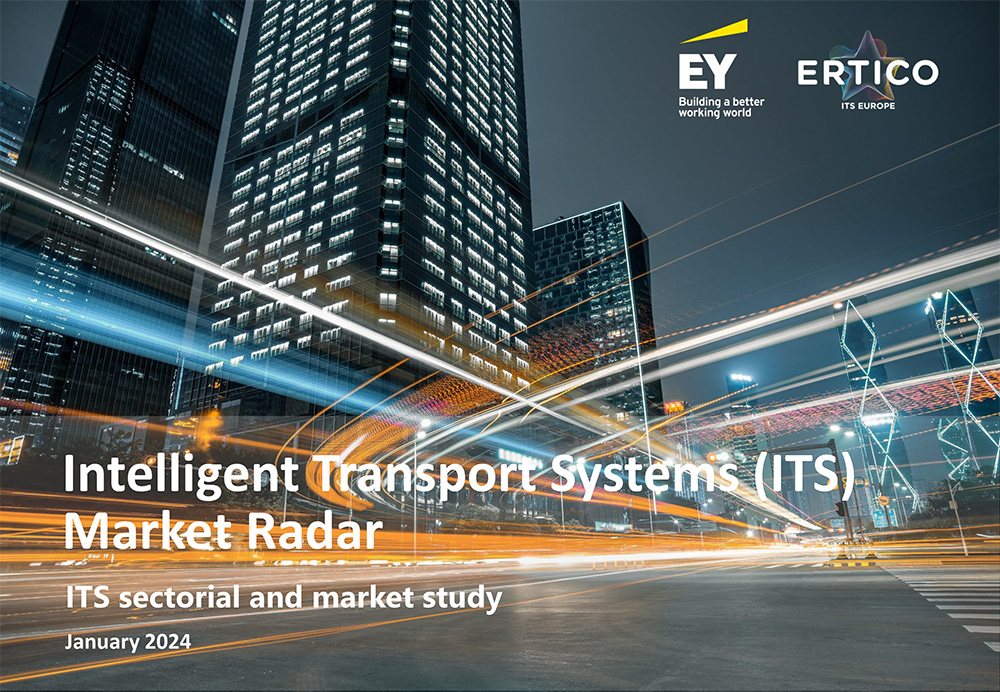
Ertico – ITS Europe’s first ITS Market Radar report was released in January but will be revisited in a special session at the ITS World Congress in Dubai in September. Devised as a series which will eventually take in eight sectors of the industry, the inaugural Market Radar edition this year focused on two areas: traffic & transport and service providers.
The plan is that the other six sectors will follow in forthcoming editions over the next three years.
Ertico CEO Joost Vantomme thinks it is useful to product facts and figures annually, a type of McKinsey report approach, taking stock, “a finger on the pulse”.
The ITS sector is famously broad – indeed, he sees it as a “conglomerate, like a holding company with all kinds of subsidiaries”.
He told ITS International: “Some of them do traffic and transport stuff, like traffic lights or smart intersections. Some others are the users of the roads like vehicles or pedestrians or cyclists. Others are providing cloud services, way above our heads, these virtual things.”
He wants Ertico’s research to highlight challenges and opportunities, and to give the organisation concrete data for its advocacy work.
Vantomme sees increasing crossover within, and between, the service providers and the traffic & transport areas: physical infrastructure remains a key component of ITS, even as artificial intelligence, digital twins and Vehicle to Everything solutions grow in prominence.
One particularly interesting element of Ertico’s Market Radar is the gentle insistence that, while research is necessary, deployment is even better. For example, robotaxis “work quite nicely in open traffic”, Vantomme says. “There are, of course, some hiccups, some pain points on connectivity, on cooperation with other ecosystems, but in terms of ITS I think we need to deploy.”

“It is a call for action and a call for awareness” Joost Vantomme, Ertico
Europe cannot risk falling behind other regions of the world when it comes to maximising the benefits of new technologies. In other areas, such as skills (especially digital expertise) there is work to be done in order to gain a competitive advantage.
A digital divide also exists in Europe. Investment happens largely (although not exclusively) at national level with some countries much more advanced in traffic technology than others: there are those which can afford to invest in connected and automated vehicle infrastructure, and those which need to spend their money on more basic transportation elements.
The Market Radar, therefore, is also to some extent a rallying cry, suggests Vantomme: “It is a call for action and a call for awareness - what do we want to do?”
Data is crucial to all this – but much of it exists in a so-called ‘egosystem’ in which everyone keeps what they have to themselves.
“There is a lot of data available, but not accessible,” Vantomme says. “Products have data, vehicles have data, cities have data with their smart infrastructure, travel information services, mobility. Data is available, but mostly for the company or the institution itself. What we need to do is make data accessible to third parties, to those who need to use it. We need to see to what extent should we, as Europe, ‘uniformise’ all the data sets so that we have comparability between all the data providers.”
Of course there are legitimate questions of security and intellectual property here. “There are more challenges than answers today, but it's going in the right direction,” he smiles.









![We’ll always have Paris: TomTom Orbis Maps combine open map data and the company’s proprietary data (©TomTom) Paris TomTom Orbis Maps open map data proprietary data [©TomTom]](/sites/its/files/2024-06/Paris_TomTom%20-%20Orbis_Overlays%20-%20WEB.jpg)



